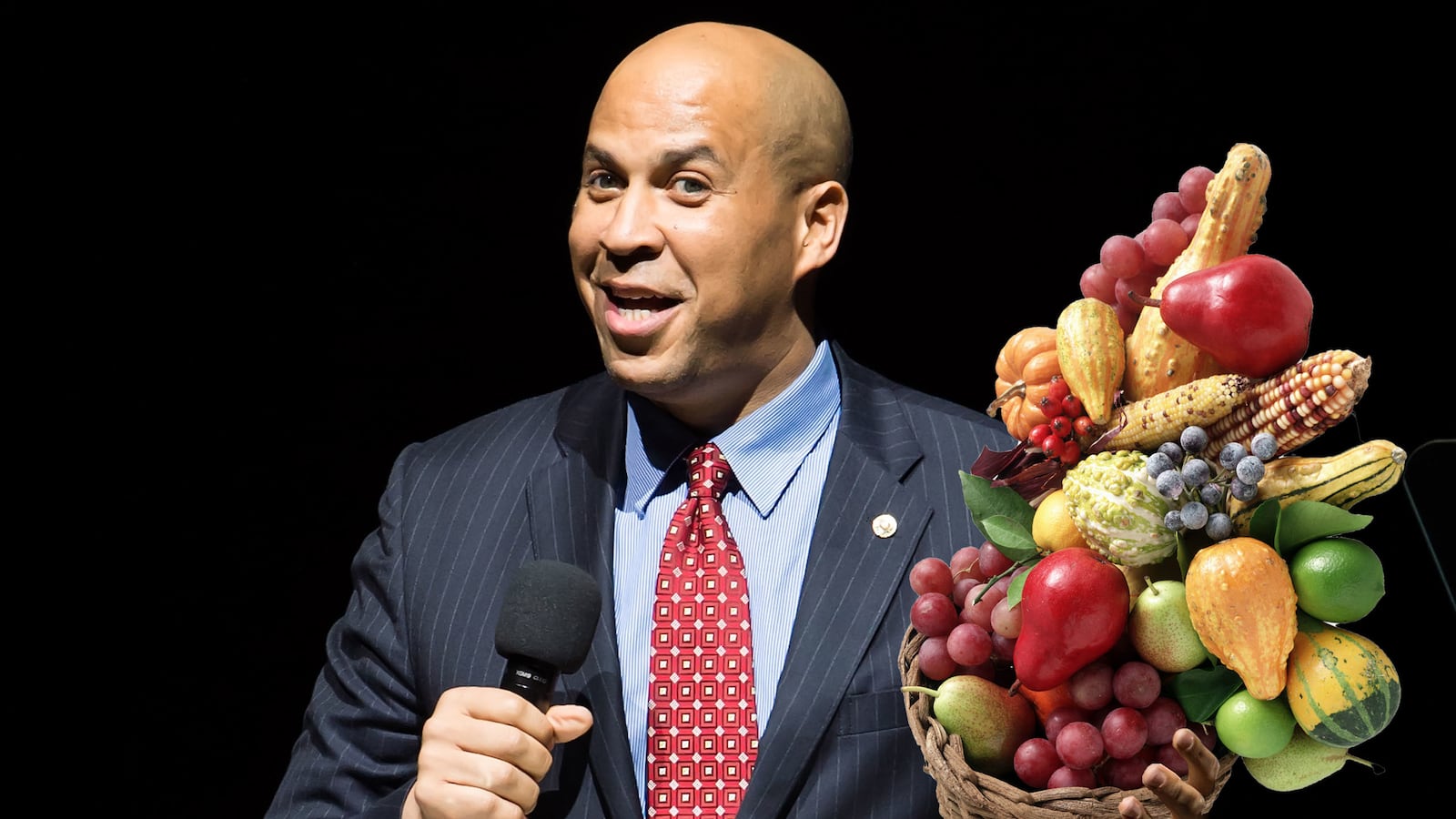In the uncomfortable and often impractical space between politics and folklore, Cory Booker presides. Few politicians garner the celebrity that Senator Booker does, and fewer still seem so earnest and human while doing it. Booker has mastered a recipe for success and magnetism that few else have: mix small but principled actions with a huge talent for motivational public speaking, and even massive problems start to seem tractable.
From poverty to bipartisanship, Booker is most effective when he can focus on the minor and human details, like pledging to get dinner with every one of his Republican colleagues or inviting victims of Hurricane Sandy over to his house. Half of his accomplishments on this front almost read like satire: he’ll save you from a burning building, he’ll live on food stamps or go on a hunger strike, he’ll even shovel you out of your house if you’re snowed in. Just use the @CoryBooker Bat-Signal and he’s there.
There’s a storybook trajectory to Booker’s mythos, and it practically embodies Americana: from Stanford college football to a Rhodes scholarship at Oxford; from Yale Law School to the city council in Newark; from Newark’s mayor’s office to the U.S. Senate. Each step of the way, Booker has thrived on the philosophy that your actions matter more than what you preach.
Most recently, Booker announced on Twitter that he would be going vegan, at least until the end of the year. This isn’t a sudden change in Booker’s principles—he’s been a vegetarian for more than two decades, personally rescued a dog in crisis on several occasions, and campaigned to establish a no-kill animal shelter in Newark (unfortunately, it fell through). Instead, Booker is trying to do a better job of living out the principles he already has. There’s an almost Christ-like quality at play: living in a mobile home on one of Newark’s worst drug corners and tweeting with a stripper (NSFW!) are only a few steps removed from washing the feet of the poor and accepting perfume from a prostitute.
“I want to try to live my own values as consciously and purposefully as I can,” Booker told me in a phone interview. “Being vegan for me is a cleaner way of not participating in practices that don’t align with my values.”
In the fall of 1992, Booker became a vegetarian “as an experiment,” he said, “and I was surprised by how much my body took to it.” He was a competitive athlete at the time, transitioning from Stanford football to Oxford basketball, and after he cut meat from his diet he felt more energetic, slept better, and recovered more quickly. This prompted him to explore vegetarianism more closely—he specifically cited Diet for a New America and Gandhi as influences—and has been a vegetarian since.
Booker briefly tried to go vegan but, as he admits in his Reddit AMA, pizza and Ben and Jerry’s were too difficult to live without. Now, Booker is reconsidering. “As a vegetarian eating a plateful of eggs, I found myself in this weird place where I didn’t want to think about where those eggs came from. I didn't want to think about the treatment of the animals who produced those eggs. When I find myself trying not to think about things, it seems to me that I’m practicing avoidance,“ he said. “I finally said, you know what? Let me just try that experiment I did some 22 years ago one more time and see what happens… Life’s too short not to try different things and to see what works for you and your body.”
There’s tension in vegetarianism, though, since many of the reasons we have to give up meat—the animal death and suffering, the negative environmental impact, the health consequences—are still problems when we look at milk or eggs. The milk industry tacitly supports veal production, since lactation requires frequent pregnancies and something has to be done with the calves. The egg industry, too, takes a staggering number of lives—every male chick is killed shortly after it hatches, and egg-laying hens are killed at around a quarter or fifth of their natural lifespan. Even more, animal agriculture produces a startling proportion of our greenhouse gas emissions (by some accounts nearly 20 percent) and consumes a shocking amount of water. The environmental consequences of animal agriculture don’t change whether a cow is grown for dairy or meat nor whether a chicken is raised for poultry or eggs.
Booker also expressed concern about his own health. “African-American males have some of the worst health data out of any sort of gender-race combination in our country,” he said. “Do I want to be an exemplar of good health and health outcomes, or do I want to participate in things that are making me unhealthy?"
Since Thanksgiving and Christmas are such food-heavy holidays, the end of the year is an interesting time to experiment with a vegan diet. Booker admits, “My mother’s cornbread stuffing is one of the best substances on the planet Earth.” Even so, he’s had it much easier this time around. “As soon as I said publicly that I was trying this experiment, so many vegans out there, hundreds and hundreds of people, have been reaching out to me with incredible support and encouragement as well as practical tips of how to do this without having to sacrifice that much in terms of the food and what I like,” he told me. “I’ve discovered some really delicious things—recipes, stores, and restaurants—that have made this transition far easier.”
Booker plans to spend his Thanksgiving dinner with CBS correspondent Gayle King and their families. “Gayle, after what seemed like some consternation, found a place to order what I feel like is the most delicious sounding vegan options,” he said.
Given all of this, Booker isn’t interested in preaching. “There’s too much judgment out there. Really what we need to be doing is just all of us finding our own paths towards living the best lives we can live as clearly and boldly in accordance with our own personal values. And that’s what I’m trying to do,” he told me.
I spoke to Booker on the phone while he was driving in an SUV, and he laughed as he admitted that it’s not great for the environment. He offers that his Prius-driving friends might go home and eat steaks, so who is anyone to judge? The problem with folk heroes is that they’ll inevitably disappoint, but it’s hard to argue that the model he sets for a good life isn't compelling. It’s unclear whether Booker will continue his vegan diet past the holidays and less clear whether in the big picture it will even matter.
Even so, he tells me, “I’m willing to entertain the possibility that it will stick.”





